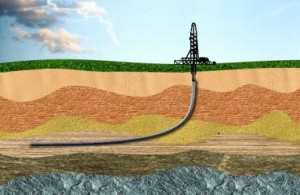There is a natural gas boom going on right now that is reshaping the global energy markets. Most people have no idea its happening, but its happening and its only the tip of the iceberg. Across the country from North Dakota to Pennsylvania down to Texas shale plays are becoming ubiquitous. What is shale? Simply put, shale is a sedimentary rock considered an unconventional source for oil and gas. Two things are needed for oil and gas to produce into a wellbore; permeability, the ability for fluid to flow through rock and porosity, the ability for the rock to hold fluid. Most people are under the assumption that oil reservoirs are large pools underground. This is simply not the case. Oil is found in the interstitial spaces of rock and to be produced into a wellbore, that oil and gas needs to be able to move freely. So why is Shale different? Shale is very tight. In other words, the permeability of shale rock is extremely low. Due to horizontal drilling and modern fracturing technologies, the shale gas can be exposed. Fracturing is a technique in which water is mixed with sand and chemicals then injected at high pressure into a wellbore to create small fractures. This artificial stimulation is the number one reason shale gas is so prolific.
Below is a list of some of the largest shale plays in the United States.
Texas: Barnett (North), Eagle ford (South), Kline (West)
North Dakota and Montana: Bakken
Oklahoma: Woodford
Louisiana: Haynesville
Arkansas: Fayetteville
Pennsylvania: Marcellus
America’s abundant supplies of oil and natural gas unlocked by hydraulic fracturing and horizontal drilling will allow us to move toward greater energy security and keep energy prices low for the foreseeable future. In turn, these low energy costs will strengthen U.S. competitiveness in the manufacturing sector, and even help us improve our balance of trade through exports of American made products. This is certainly good news for the U.S. economy, as it means more U.S. jobs, increased revenues for the government and a reduction in the trade deficit. The United States is quickly becoming a goldmine for natural gas and the landowners can expect some nice paychecks!





Pingback: How Importing Oil Hurts Our Economy - Hill Country Exploration, Inc.